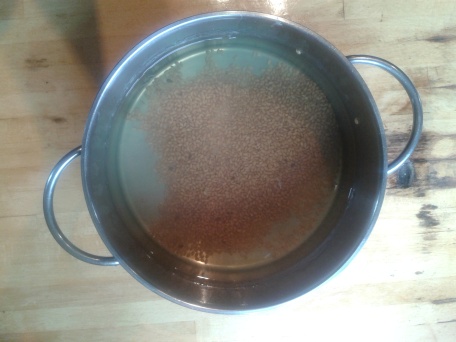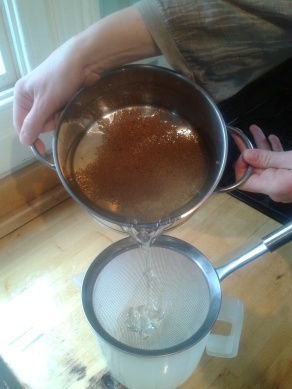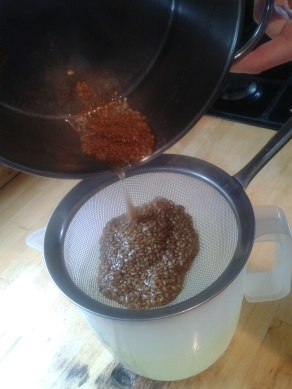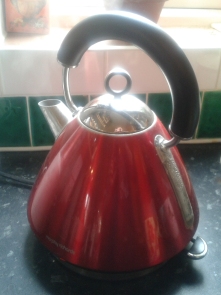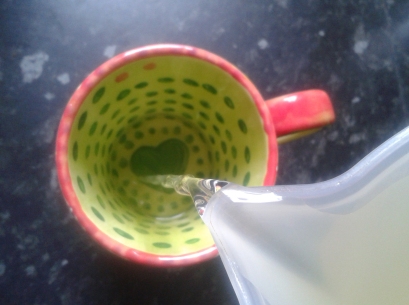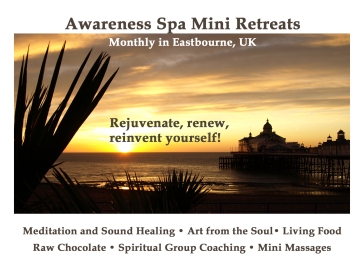Linseed Tea
Why linseed tea? Because it’s good for ya 😉
I wanted it to be part of our Mini Retreats as a way to introduce others to its soothing and rehydrating properties. Most people know the small brown or golden linseeds and may have used linseed oil as a supplement to replenish their omega-3 levels, but not many have heard of it as tea.
I came across it first in Barbara Wren’s book “Cellular Awakening“, which addresses the natural healing processes of our bodies on a cellular level. A very interesting read! “The founding principle of cellular awakening is that any kind of stress is registered on the water component of the body as dehydration.” So stress registers in the body as dehydration and dehydration also causes stress in the body. This can become a vicious circle, hence the importance to keep our body hydrated. According to Barbara it is our colon that registers dehydration which is why we need to give this part of the body the clear message that we are hydrated. Our diet needs to be hydrating and reassuring to our colon.
This is what linseed tea does. It covers the intestinal walls with a mucous layer that acts similar to absorbent gel in hanging flower baskets which catches the water so that it doesn’t just run out when the soil is very dry. It gives the plant a chance to rehydrate by slowly giving the water back, which is the same as what the layer of linseed does to your intestinal walls.
Our body consists to about 70% of water, of which our brain alone is 80% water. If the brain isn’t hydrated enough we can’t function properly. Just like the brain can’t survive long without oxygen. Water itself is incredibly receptive to outside influences. This is addressed in our sound healing, which is also part of our retreat and which I have also written about. Check out Dr Masaru Emoto’s experiments with water!
Dehydration changes our body pH, which in turn makes us more acidic which then makes us more prone to illnesses. Sugar, which I am lecturing about a lot, also has a dehydrating effect on the body. If you can’t live without sugar yet, try at least to cut it down. You will feel much better straight away!
At first I thought that the taste of linseed tea was rather odd, but the more I drank, the more I cherished it, together with a plumper skin, less blemishes, less food cravings, a soothed intestinal tract and less reactions to my common food intolerances. It also helps to balance my blood sugar levels.
How to make your own linseed tea:
For 1 three day batch of tea.
1. Take 2 TBSP linseeds on 1 litre of water.
2. Bring to the boil, take off heat, leave to stand covered for 12 hours or overnight.
3. Bring to the boil, gently simmer for one hour and then strain off the seeds.
4. The fluid should now be a nicely gloopy consistency. That’s the bit that will help rehydrate your colon! The seeds can go on a compost if you have one, otherwise in the bin.
5. Fill about 1/4 of your mug with the thickened fluid and top it up with hot water to make tea. You may want to use less of the thickened fluid if it is very thick because it can be a strange sensation trying to gobble it down 😉
6. Drink a cup of linseed tea about three to four times a day. Best is half an hour before a meal to prepare your gut.
7. Use and store remaining thickened fluid in an air tight container in the fridge for up to three days, after which it will go off and taste funny.
A little bit on the seed itself: Linseed, also called flaxseed, is a food and fibre crop which grows in the cooler regions of the world. Until the nineteenth century, flax was predominantly used to produce cloth before cotton took over, although the fibres in flax are twice as strong. Linseed oil is not only very nutritious but also used in paints, varnishes, linoleum and printing inks. It is native to the area stretching from the eastern Mediterranean to India. A discovery of spun, dyed, and knotted wild flax fibres in a prehistoric cave in the Republic of Georgia shows that the plant was already in use by humans around 30,000 BC.
Both brown and golden linseeds have similar nutritional values and omega-3 fatty acids. You can either enjoy the seeds sprinkled directly over your muesli or in home made bread and obviously as tea. Excessive consumption of flax seeds with inadequate water is said to cause bowel obstruction. It is considered to have antioxidant and cancer-preventing properties and is used as a nutritional supplement because of its high levels of α-Linolenic acid (a particular form of omega-3 fatty acid).
Discover what linseed tea has in store for you! Either try making it yourself or come and sample it at one of our Mini Retreats!
If you like to take part in a Mini Retreat in Eastbourne, UK, get in touch! Check out the dates for our retreats in 2013.

